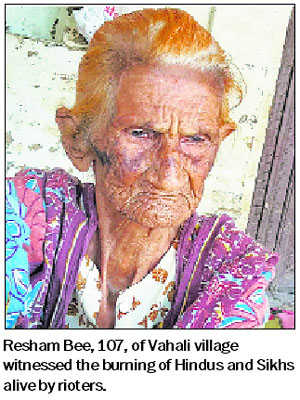Horrors of Partition: ‘They set them all on fire’
Nabeel Anwar Dhakku
There was a time when Chakwal's numerous villages had considerable Sikh and Hindu populations. Vahali village, being the capital of the Vahali state, was home to the Sardars of Vahali. The Sardars were not only the owners of Khewrah's salt mines, they also served at top positions in the courts of Punjab and Kashmir. Their rulers included the Mughal emperor Shah Jahan, the Rajas of Kashmir and Poonch, Queen Victoria of the British Colonial Government and King George after her. In the summer of 1947, the Sardars of Vahali went to spend some time in Shimla, but could never return to their homes. Vahali had been burnt to ashes.
The sudden surge in violence was a stark contrast to the peace and tranquility that had previously existed in Vahali. Frightened Hindus rushed into the Maari (a grand house with more than 100 rooms) of Sardar Hari Singh, hoping the rioters would not attack them due to Singh's influence. Yet Muslim rioters set the Maari ablaze, burning alive more than 200 Hindus, including women and children.
‘My best friends were Hindus’
"We were living in peace and harmony. My best friends were Hindu women," recalls 107 year old Resham Bee. She added that Muslims in this area did not plan to attack Hindus, but a group of enraged rioters from neighbouring Minhala village stormed Vahali.
"Hindu women carrying their children desperately pleaded for mercy. They begged and conceded to send their children to village seminaries and even pleaded with Muslim rioters to marry their Hindu girls, converting them to Islam. However, no person heard their cries, as every Muslim was focused on plundering gold, currency and other valuables stashed in the Maari. They set them all on fire," recalls Resham Bee, who was a witness to these horrors.
It is senior citizens such as Resham Bee who are part of the last generation of Pakistanis to have witnessed peace and cultural diversity. However, they have also witnessed gory riots, which constituted one of the largest massacres and migrations in history. These individuals are those who still harbour the sweet and bitter memories relating to Partition.
Yet, the governments of India and Pakistan have not constructed a memorial at the Wagah border, to pay homage to the victims of the gory riots. Nonetheless, the nostalgia-stricken senior citizens in Chakwal's villages still languish in the memories of their non-Muslim friends.
Manmohan Singh was their ‘Mohna’
Hindus and Sikhs were also slaughtered in many other villages such as, Dhudial. "When my daughter was born, my Hindu friend Vidya was the first to congratulate me. She presented me homemade ladoos. We were living with unity and used to respect each other's feelings. We did not slaughter cows in front of Hindus and they did not eat and drink anything during Ramazan before us," reminisces Khursheed Begum, 94, a resident of Dhakku village, the ancestral village of Gursharan Kaur, the wife of former Indian Prime Minister Manmohan Singh.
"We used to call Manmohan Singh, Mohna. We are happy that he became the Prime Minister of India. We wish him to visit Gah village once in our lives," longed Ahmed Khan Hajial and Ghulam Muhammad Khan, former classmates of Manmohan Singh.
When women preferred to perish
Mola Bukhsh, a 90-year-old resident of Haraaj village, remembers an incident of a Hindu man who showed tough resistance to Muslim rioters in the adjacent village of Gugh throughout that day. By evening, however, rioters had set the building on fire where the valiant man stood. "More than 30 Hindu women asked this brave man what they should do. He ordered them to plunge into the fire, rather than getting raped and killed by rioters, and so all the women obeyed him. Later, this Hindu man also jumped into the fire," Mola Bukhsh recollects of the horrific episode.
Another resident of Vahali, 95-year-old Haji Nazar Mohammad, remembers the niceties of Hindus and Sikhs toward their Muslim neighbours. "Ramtar, a Hindu trader, donated large amounts of wood for the ceiling of our village mosque," says Mohammad, evoking memories of a better time, now a distant in danger of being lost in the annals of time.
By arrangement with the Dawn









